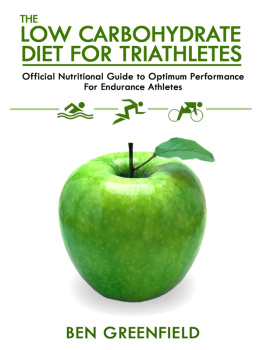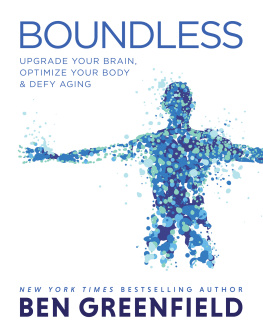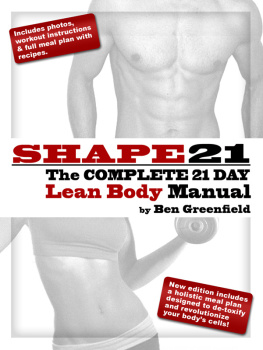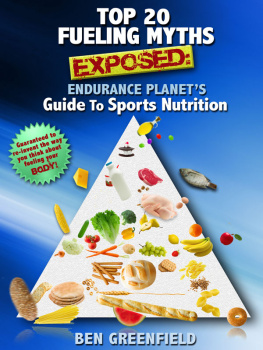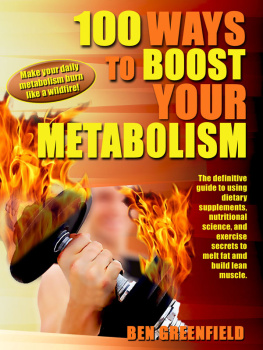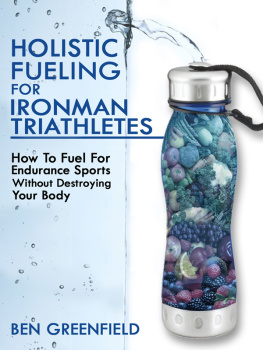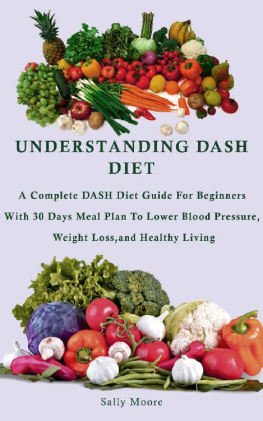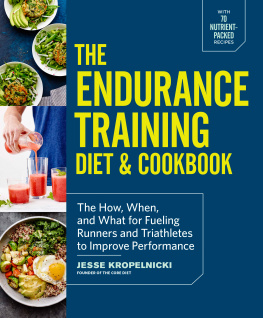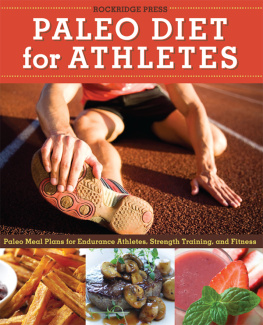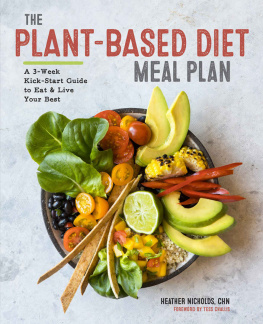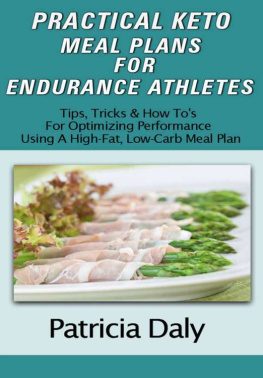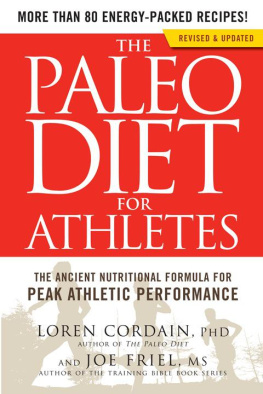Prior to beginning any exercise program, you must consult with your physician. You must also consult your physician before increasing the intensity of your training. The information in this book is intended for healthy individuals. Any application of the recommended material in this book is at the sole risk of the reader, and at the readers discretion. Responsibility of any injuries or other adverse effects resulting from the application of any of the information provided within this book is expressly disclaimed.
Price World Publishing
www.PriceWorldPublishing.com
Copyright 2012 by Ben Greenfield
All rights reserved. Neither this book, nor any parts within it may be sold or reproduced in any form without permission.
eISBN: 9781619841420
Introduction
I bet I know what youre thinking.
If you burn a significant number of carbohydrates during endurance exercise (and you do), then how on earth can it be beneficial to consume a low carbohydrate diet?
In the first few pages of this guide, youll not only learn why a low carbohydrate diet may be the smartest nutritional change youll ever make in your training program, but youll also find out why a high carbohydrate diet may be hampering your performance, your health and your longevity.
Next, youll find out how to answer to common objections your friends and training partners will probably throw your way once you begin a low carbohydrate diet, such as isnt carbohydrate and glucose necessary for energy?, if you replace carbohydrate by eating more fat, wont your cholesterol increase? and of course, the ever popular how the heck are you going to carbohydrate load?.
Then youll get an overview of the low carbohydrate diet for triathletes. Specifically, youll learn proper carbohydrate, fat and protein percentages (prepare to be shocked), how to incorporate carbohydrate cycling so you dont bonk during long training sessions, and the basic foods and dietary supplements youll need to have sitting around your kitchen.
Finally, after reviewing your grocery shopping list, well launch into the meat of the diet (pun intended), in which youll find out how to eat a low carbohydrate diet for a regular week of training, for a race week and for race day.
So what qualifies me to tell you how to eat a low carbohydrate diet?
First, and probably not too importantly, I am a sports nutritionist and exercise physiologist with many years of experience coaching triathletes and tweaking the diets of elite athletes to weekend warriors. Second, and more importantly, I have successfully incorporated this diet into my own training, as well as the programs of the athletes I coach, and found incredible success in well-being, energy, gastrointestinal function, training sessions and race day performance. In other words, Im not just spewing out a regurgitated form of the Atkins diet but instead giving you a nutrition plan that has been formed through testing, experimentation and a lot of significant tweaks.
So are you ready to defy the paradigm of how 99% of the sporting world is eating and learn a nutritional approach that is going to revolutionize your training and your health? Lets jump in.
Ben Greenfield
Why Choose Low Carbohydrate?
I do not recommend a low carbohydrate diet for everyone, and I especially do not recommend it for athletes who are in training phases for which they are undergoing long hours of higher intensity training (such as a professional Ironman triathlete). But there are three categories of endurance athletes who would benefit from choosing a low carbohydrate diet:
1) Athletes trying to lose weight.
A key component of weight loss is tapping into storage fat (adipose tissue) for energy. This fat access simply cannot happen if the body is constantly drawing on carbohydrate reserves and blood glucose for energy. In a moderate to high carbohydrate diet, not only does the utilization of fat for energy become far less crucial, but the body never becomes ideally efficient at using fat.
There is a growing body of evidence that a high fat, low carbohydrate diet causes faster and more permanent weight loss than a low fat diet. Furthermore, appetite satiety and dietary satisfaction are significantly improved with a high fat, low carbohydrate diet that includes moderate protein intake.
My own personal experience with a low carbohydrate diet began with an off-season attempt to lose holiday fat pounds, followed by the stark realization that contrary to my expectations and what I had been taught in traditional sports nutrition classes, my performance and energy levels actually improved despite a lower carbohydrate intake.
2) Athletes wanting to improve health and longevity.
When glucose is used to create energy, a high number of free radicals are produced. Free radicals are dangerous molecules that can damage normal cellular processes. The burning of fat for energy does not create this same cellular damage. In an endurance athlete who is already creating a high number of damaging free radicals from exercise, further damage from high blood glucose levels becomes a nasty one-two combo.
In addition, the constantly elevated levels of circulating blood sugars that can be caused by a moderate to high carbohydrate diet are associated with nerve damage, small dense cholesterol particles (the culprits for heart disease), high morbidity, bacterial infection, cancer progression and Alzheimers.
As you will learn later in this guide, simply getting these your energy levels from non-blood glucose based energy sources can directly improve your quality of life, and allow you to ensure that you live longer and healthier.
3) Athletes who have consistently poor performance or gastrointestinal distress while training or racing.
Because of genetic predispositions, some athletes are much more sensitive to the fluctuations in blood sugar caused by carbohydrate intake. Often, the result of this sensitivity is a short-lived initial increase in energy levels after consumption of a sports bar, sports drink, gel or other carbohydrate source, following by a sharp and drastic drop in energy levels. But the calories from fats and proteins are utilized at far more stable rate than carbohydrate sugar, resulting in more stabilized energy levels.
In addition, uncomfortable amounts of gas and bloating in the endurance athletes can be due to the high rate of bacterial activity caused by carbohydrate fermentation in the digestive tract. Many athletes experience an even greater degree of gastrointestinal distress from food allergies or intolerances to common carbohydrate sources, particularly wheat.
So who should not choose a low carbohydrate diet?
First, endurance athletes in the heat of competition, such as during an Ironman triathlon, will certainly need a higher carbohydrate intake than appears in the typical training week meal plan in this guide. But thats why there is also a race day plan included!
Next, endurance athletes going through an extremely heavy block of training that is a higher load to which they are accustomed, such as a triathlon camp that involves 25-40 hours of training per week, will also need a higher carbohydrate intake (although this volume of training and carbohydrate intake is not healthy, it is a necessary sacrifice for injecting large doses of endurance into the body).
Finally, individuals with diseases or conditions that disable the ability to properly metabolize fats and proteins (such as gallbladder removal) may also need to eat a higher percentage of daily calories from carbohydrates.
Answering Objections
Once your training partners, family or other friends learn that youre eating fewer carbohydrates, youre guaranteed to hear several objections and see some raised eyebrows. Typically, the criticism of a low carbohydrate diet falls into three categories of questions:
Next page
